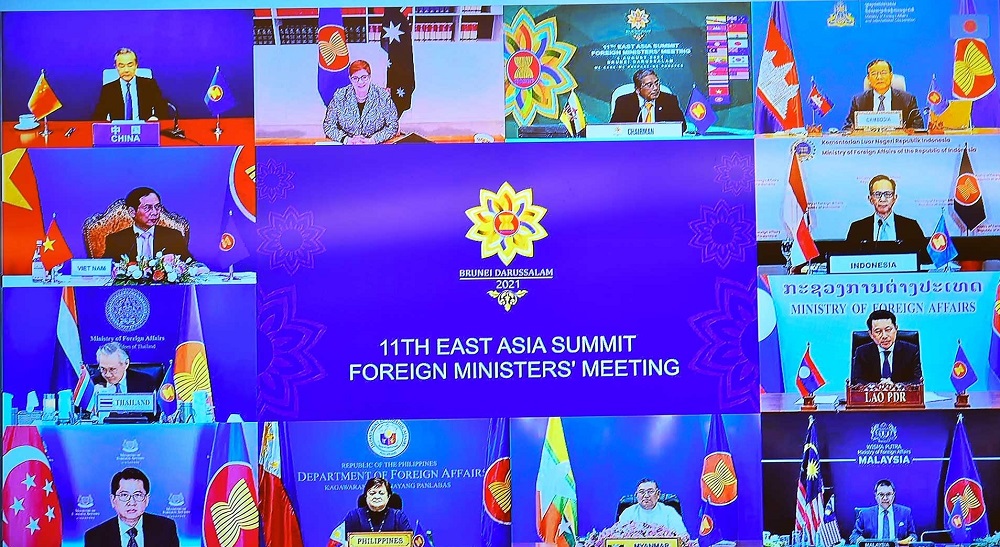East Asia Summit promotes comprehensive recovery
Join hands to manage the Covid-19 pandemic, accelerate trade and investment, and explore ways to work more closely on recovery plans are the main driver of the regional countries.
Ten ASEAN member states together with Australia, China, India, Japan, New Zealand, Russia, South Korea, and the US have exchanged views on promoting comprehensive recovery plans to prepare for sustainable development in the region.
| Representatives at the 11th East Asia Summit (EAS) Foreign Ministers’ Meeting on August 4. Photos: MoFA |
Foreign ministers of these countries reached the consensus at the 11th East Asia Summit (EAS) Foreign Ministers’ Meeting via a videoconference on August 4.
The main issues included the ongoing management of the Covid-19 pandemic, the importance of joint working to accelerate economic recovery, and the exploitation of further opportunities for partners to work more closely on health, economic, and security matters facing the region.
The ministers agreed that EAS countries need to strengthen their capacity and cooperation to cope with challenges that threaten the region and the world as a whole.
In the face of complicated Covid-19, the countries emphasized the need to uphold multilateral approach, regional and international cooperation, and joint Covid-19 response efforts.
They vowed to complete the Manila Plan of Action for 2018-2022 with a focus on priorities suitable to the new situation, making them effective for the recovery and growth drive.
The countries agreed to promote economic links with smooth trade and investment and a stable supply chain, removing movement restrictions, and accelerating green growth.
To support the recovery plans, partner countries pledged to give ASEAN more assistance in preventive healthcare, develop Covid-19 vaccines and equitable vaccine distribution, and supply medical equipment.
ASEAN’s partner countries also affirmed their support in innovation, digital economy, e-commerce, renewable energy, and climate resilience.
Notably, they discussed the preparedness for the 16th EAS in October 2021 with pillars on spiritual health, green growth, and tourism-driven growth, in addition to the regional and global security threats of mutual concerns, including the South China Sea issues, the implementation of the Five-Point Consensus for Myanmar political turmoil.
| Vietnam’s Foreign Minister Bui Thanh Son at the meeting. |
Speaking at the meeting, Vietnam’s Foreign Minister Bui Thanh Son highlighted the role of EAS in contributing to peace and security in the region on the basis of sharing mutual benefits. He called for the related stakeholders to maintain the EAS principle of treasuring dialogue over other means that have lasted for the past 15 years.
Son called for the ASEAN partner countries to assist the bloc in vaccine reliance through tech transfer and the operations of the vaccine production chain in the region.
He added that a smooth global supply chain together with an open market, and favorable trade and investment would be key to tap the potential of the regional trade pacts like the Regional Comprehensive Economic Partnership (RCEP) and the Comprehensive and Progressive Agreement for Trans-Pacific Partnership (CPTPP).
After the meeting, US State Secretary Antony Blinken tweeted “The EAS is central to the U.S. vision for a free and open Indo-Pacific and peace and prosperity in the region.”
The East Asia Summit (EAS) is the Indo-Pacific's premier forum for strategic dialogue. It is the only leader-led forum at which all key partners meet to discuss political, security, and economic challenges facing the Indo-Pacific, and has an important role to play in advancing closer regional cooperation.
ASEAN leads the forum, and the chair position rotates between the ASEAN Member States annually. In addition to their discussions, leaders issue statements on topical issues, to signal political will for framing policy responses and to provide a basis for cooperation.
In 2020 EAS members represented 54% of the world’s population and accounted for 62% of global GDP worth an estimated US$52.3 trillion.













